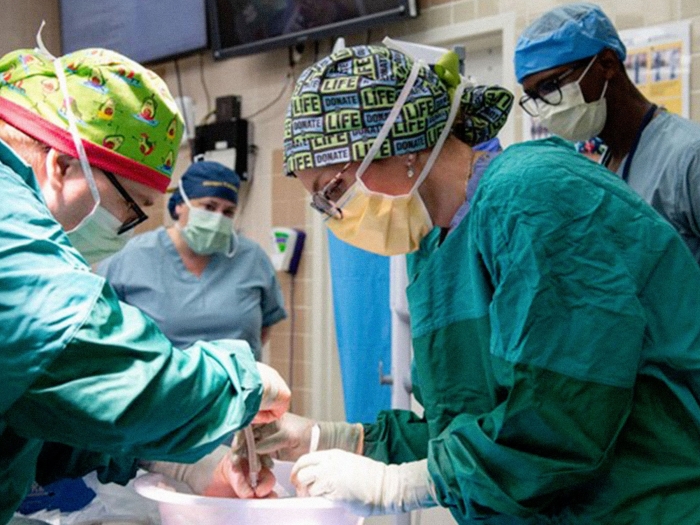Findings from the largest trial of its kind to date point to more control over treatment choices for patients with appendicitis.
1:07 PM
Author |

When making a decision about a course of treatment, information is good, but specific data is better. New data shows that this is true of appendicitis, one of the most common conditions treated with surgery in the United States.
The Michigan Medicine Department of Surgery participated in a large clinical trial which found that, in many cases, appendicitis can be safely and effectively treated with antibiotics instead of surgery. The data from the trial, published in the New England Journal of Medicine, give patients and the providers who treat them more to go on when deciding on a course of treatment.
"This reflects everyday choices patients make regarding their health and gives them information to make a decision that's right for them," says Pauline Park, M.D., a professor of surgery in the division of acute care surgery, who helped direct the trial at Michigan Medicine.
A large trial targeting a common condition
The randomized controlled trial, Comparing Outcomes of Drugs and Appendectomy, was funded by the Patient-Centered Outcomes Research Institute, also known as PCORI, and is the largest trial of its kind to date. It ran from May 2016 to February 2020, involved 25 sites in 14 states, and was led by the University of Washington.
A total of 1,552 patients presenting with appendicitis across all sites were assigned either to a surgery group or antibiotics only group. Another cohort of 500 people that opted out of randomization, but instead chose antibiotics or surgery, agreed to continue in an observational group for tracking.
Appendicitis is an attractive target for a study because it's so common and the findings can have a large impact; during the enrollment period at Michigan Medicine alone, 331 adults presented with appendicitis.
Of the patients in the trial who were treated with antibiotics and without immediate surgery, approximately 3 out of 10 subsequently underwent an appendectomy by 90 days. That rate was higher—approximately 4 in 10—for those with an appendicolith, a calcified deposit within the appendix, compared to 2.5 in 10 for those without an appendicolith.
Complication rates were higher overall in the antibiotics group of patients because of the appendicolith subgroup of patients, but there was no increase in complications in the non-appendicolith patients within this group.
Both groups experienced symptoms from their appendicitis for about the same amount of time.
When looking at quality of life measures, the antibiotics group fared well, with nearly half avoiding hospitalization for initial treatment and missing less time from work or school. But, the same group reported more visits to the emergency room and days spent in the hospital overall, partly due to recurrent episodes.
Both groups spent the same time in health care settings overall at initial treatment, with 70% of the antibiotics-only group avoiding surgery over the next 90 days.
More specific data for a more informed choice
The clinical trial is notable for the wide variety of patients included. Since appendicitis is seen so frequently, the participant panel reflects the patient population at large with regard to race, gender and other demographic factors.
Notably, the trial also included patients with appendicoliths, who were excluded from European appendicitis trials measuring antibiotics against surgery. Such patients are considered part of a higher risk group, and surgery is usually indicated.
MORE FROM THE LAB: Subscribe to our weekly newsletter
Hasan Alam, M.D., brought the trial to Michigan Medicine when he was the head of general surgery. Now the chair of the department of surgery at Northwestern University Feinberg School of Medicine, Alam welcomed testing assumptions about different disease phenotypes.
"Patients come with an entire spectrum of presentations," Alam says. "The data from the European trials had clear limitations. We could apply these findings to some patients, but the vast majority fell out of the narrow boundaries set for patient selection in these trials. It was a very conscious decision to have wider inclusion criteria in the drugs and appendectomy trial, which creates some noise, but also creates more applicability and clinical relevance."
Much of the signal within the group that didn't see their appendicitis resolve with antibiotics did in fact come from the appendicolith group; 4 out of 10 of those patients needed surgery anyway, compared to 3 out of 10 from the non-appendicolith group.
"The study confirmed that patients with an appendicolith are a higher-risk group," Park says. "For clinical practice, the study supports continuing to recommend surgery for patients with an appendicolith."
Considerations for cancer
Cancer can accompany appendicitis, and it's one reason surgery is sometimes preferred by patients and providers.
The trial did find cancers in seven of the 776 appendectomy-assigned patients, and two of the 776 antibiotics-assigned participants at 90 days.
It's unclear what impact a delay in a cancer diagnosis might have in cases where an appendectomy isn't immediately performed, and it will be a future area of focus of the trial.
"There's always a concern," Alam says. "When you take the appendix out, the cancer is out with the appendix. If you treat with antibiotics, the concern is that you might leave an underlying cancer and not treat it."
A patient-centered approach
The trial's main driver was patients' satisfaction with their decision and quality of life.
Knowing there is a good chance they can resolve their disease with antibiotics, or at least buy themselves time with antibiotics, before a surgery is needed is a powerful consideration—and one often tied to the more mundane aspects of life, like scheduling.
"The data support allowing patients to have more control over treatment choices for appendicitis which impact their lives, by allowing them to defer or even avoid surgery," Park says.
Alam says it's important to remember that a surgeon and a patient may place different weights on certain measures and be invested in what matters to the patients, so long as treatments are comparable and safe.
"As a surgeon, you may be looking at some endpoints that are meaningful for you, but patients may feel that getting five days of antibiotics or being in the hospital for an extra day to avoid an operation is a worthwhile tradeoff," Alam says.
Another reason to delay or avoid surgery: COVID-19
According to Park, the COVID-19 pandemic compressed the trial reporting timeline. Patients with COVID-19 have a higher complication rate after abdominal surgery, so it's critical to know now whether it's safe to choose an antibiotic course to delay or avoid an appendectomy.
Initially structured to follow up on outcomes at the one-year mark, the trial results were instead measured and shared at the 90-day mark.
"Antibiotics may totally resolve the appendicitis, or at least delay the need for surgery, and that's important in the time of COVID-19," Park says. "We know that the majority can be safely managed with antibiotics, recover from COVID-19 and then choose to have an appendectomy or not."
She adds, "The trial is continuing to follow the patients so that we will know if these 90-day results stay true out for a year."
Paper cited/DOI: "A Randomized Trial Comparing Antibiotics with Appendectomy for Appendicitis," New England Journal of Medicine. DOI: 10.1056/NEJMoa2014320

Explore a variety of health care news & stories by visiting the Health Lab home page for more articles.

Department of Communication at Michigan Medicine
Want top health & research news weekly? Sign up for Health Lab’s newsletters today!





